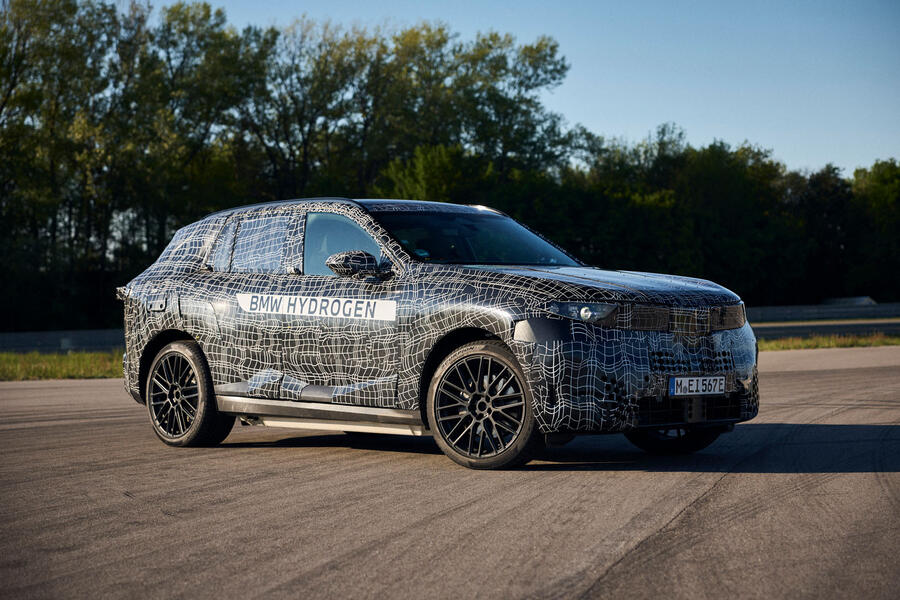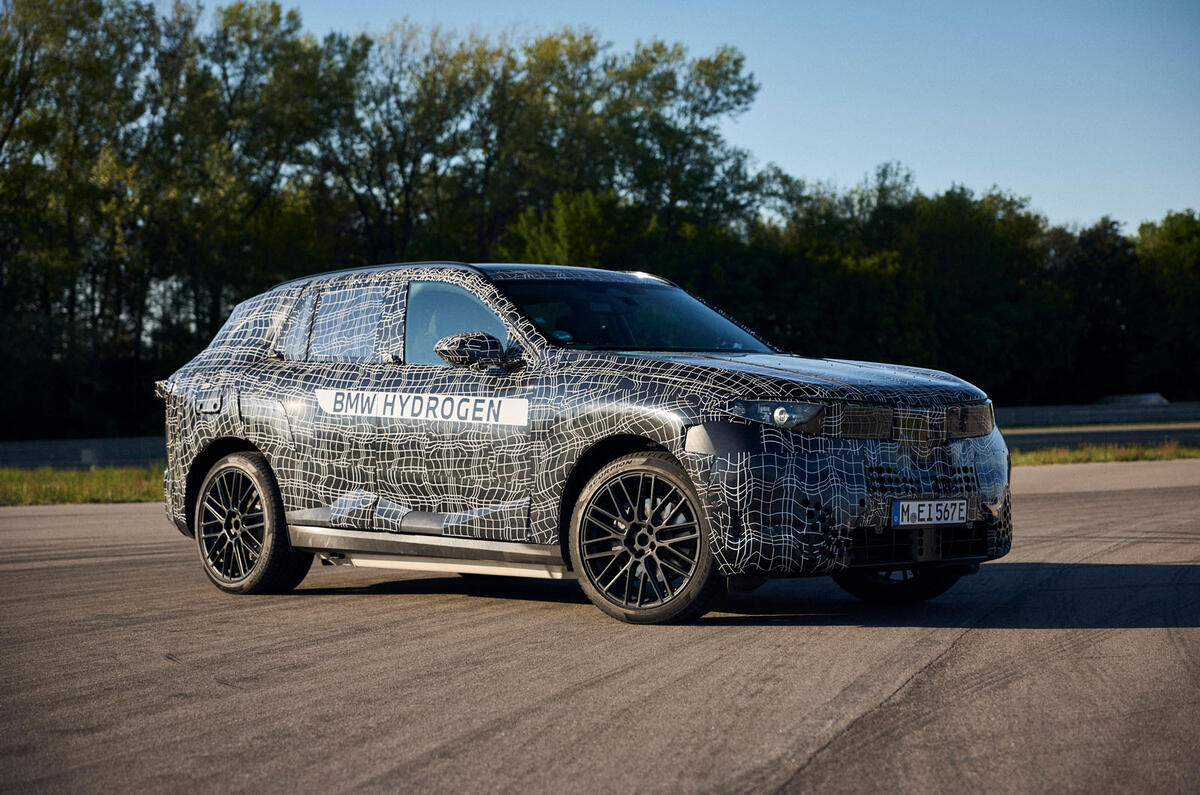BMW has announced the first official details of the hydrogen X5 SUV that is scheduled for a market launch in 2028.
The arrival of the new FCEV will mean the fifth-generation X5, due on sale next year, will offer BMW’s broadest-ever range of powertrains: petrol, diesel, plug-in hybrid, battery-electric and hydrogen fuel cell.
It has now been revealed in prototype form, with BMW officially confirming it will take the same iX5 name as the BEV variant.
“The launch of the X5 in five drivetrain configurations demonstrates our determination to serve different customer needs globally,” said Joachim Post, the German manufacturer’s R&D boss.
Although heavily camouflaged, the iX5 Hydrogen prototype hints at how the Mk5 X5 will adopt the bold Neue Klasse look that was introduced on the Mk2 iX3 at the recent Munich motor show.
Building on the iX5 Hydrogen test mule that was introduced in 2023, the new prototype uses a third-generation fuel cell stack, developed with Toyota, which is around 25% smaller than the current stack yet delivers greater power density and efficiency.
The system integrates a new high-voltage control unit, dubbed the BMW Energy Master.

Production of key components is scheduled to begin in 2028 at BMW’s plants in Steyr, Austria, and Landshut, Germany.
Performance targets have not yet been revealed, but BMW said the new system will surpass the outputs of the 2023 FCEV prototype: a 187bhp stack with a 295bhp rear-mounted electric motor for a total of 396bhp and around 313 miles of range.
BMW has yet to confirm full details of the new X5, but it is set to be based on an updated version of the company’s long-running Cluster Architecture (CLAR), rather than the new Neue Klasse EV platform, as used by the iX3.
The battery can clearly be seen packaged within the structure of the new iX5 Hydrogen prototype, supporting this CLAR speculation, as the Neue Klasse platform would have the pack integrated into the floor.
Inside, the prototype is seen to house a full-width head-up display and a 17.9in central infotainment screen, confirming that Neue Klasse design cues will also feature in the cabin.
BMW will phase out its long-running iDrive rotary controller, shifting towards touch and voice operation.





Join the debate
Add your comment
Just - why?
Are the flying pigs in Munich going to provide the hydrogen in 2028, or more likely CO2 ?
Very strange. What market are they aiming at? Or to put it another way, what part of the world has Toyota's Mirai been successful?
And I'm not sure why the range is of importance other than mst people will need to travel further than that just to fill up ! Forget the UK, just read a stat which says there are only 57 hydrogen fuel stations in the whole of the United States, everyone of them being in California ! Begs the question what sort of subsidies has California given.
It makes zero financial sense for BMW to produce this car so why are they doing it?
How many slow EV chargers were there when, 20 plus years ago, this EV nonsense started? What was the mobile phone network coverage when they started? Airbus are developing planes that use hydrogen, trains will follow, cars, buses, and trucks after that. Hydrogen vehicles emit just water. EVs are not "green", in fact they are the opposite. Cost too much to buy, too much to run (higher insurance, more tyres, more brake pads, Mount Everest depreciation, higher than petrol now, at away from home chargers). We don't how much hydrogen cars will cost, nor the cost per litre. Happy to wait 10 years. Still using my 15-year-old petrol car, zero reason to change, but if I did it would be another petrol car. EVs will go in the history books, as fools vehicles. Dumb tech, bought by the gullible. It makes zero sense to still make EVs when they can't sell the ones they are making now.
Reactionary rubbish. You just reveal how little you know and how prejudiced you have let yourself become by describing EVs as "nonsense".
In particular to say that "Hydrogen vehicles just emit water" just further demonstrates your ignorance. Hydrogen has to be produced, compressed, and stored (without escaping), all of which are very energy-intensive.
Why not do a bit of research before posting such ill-informed nonsense?
User8472 - if you think battery EVs are "nonsense" and "cost too much", and planes, trains and buses will follow, then I don't think you've been following the news. To start with, Airbus has significantly rowed back on any hydrogen plans - https://www.greenairnews.com/?p=6742 - and a widespread view is the scaling back is likely to mean eventual abandonment.
Trains? The latest in the UK is a focus again on battery, and the few experimental ones in Germany have been plagued with problems. Buses? Hardly - Tfl have 20 hydrogen buses bought as a trial, but a couple of thousand battery ones bought since. Does that give an idea of how unsuccessful they see the hydrogen fuel cell models? And similar with the early days of green trucking.
Saying "Hydrogen vehicles emit just water" is also far from the full story. It CAN be made (fairly inefficiently) via electrolysis, but nearly all the hydrogen available today comes from reforming fossil fuels with consequent carbon emissions. Hydrogen via electrolysis just can't compete on price, and it's simply more sensible to use the electricity directly and store in a battery. Batteries may have an environmental price - but so do hydrogen FCEVs - from expensive and rare metals as catalysts to the carbon fibre used in the pressure tanks.